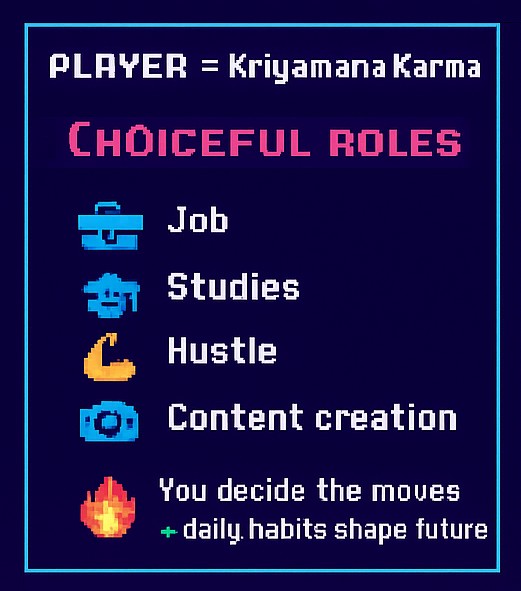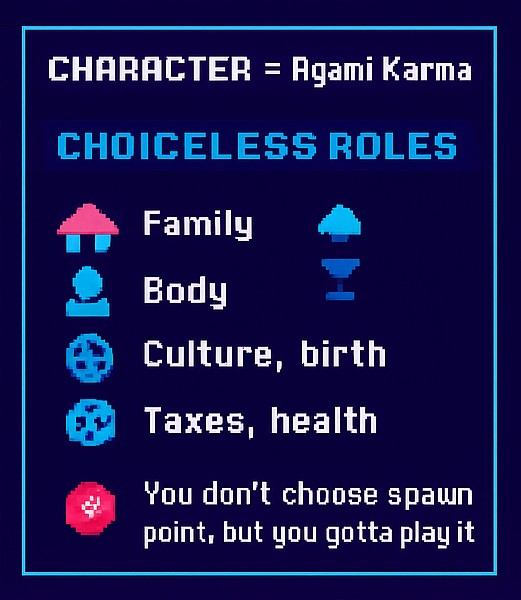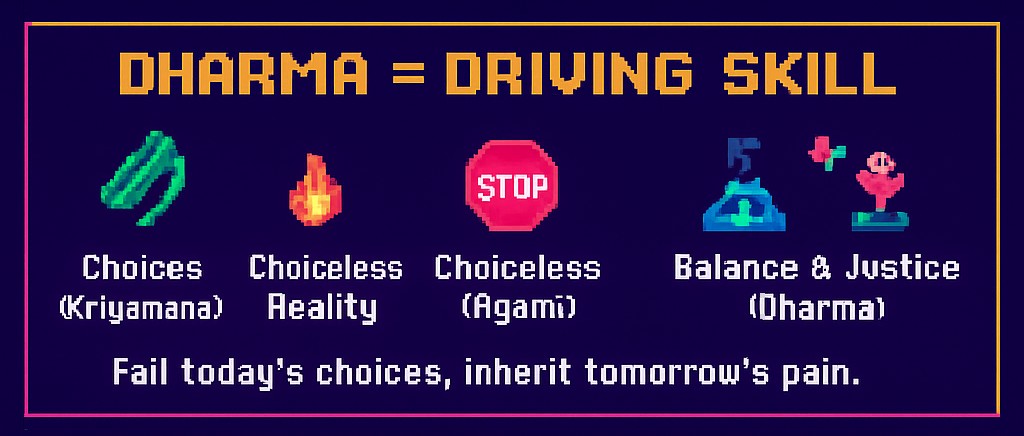Ever feel like life is a constant tug-of-war?
On one side are the things you choose: your career, your friends, how you spend your time, the person you want to become.
On the other side are the things chosen for you: your family, your background, unexpected crises, obligations, and just… stuff that happens to you.
This tension is real. It’s the source of most of our stress, anxiety, and confusion. We’re told we can “be anything,” but then life throws a curveball that makes us feel utterly powerless.
What if there was a framework, not from a self-help guru, but from an ancient philosophy, that doesn’t just explain this tension but gives you the tools to master it?
It’s called the interplay of Karma and Dharma. And forget the pop-culture myths — this isn’t about punishment or fate. It’s a dynamic system of energy management for your daily life.
Let’s break it down with a modern twist.
Part 1: Your Two Types of “Roles” in Life
Imagine your life is a game where you are both a player and a character. Each comes with a different set of rules.
1. Kriyamana Karma: Your Choiceful Roles (The Player)
This is your power of choice in the present moment. These are the roles you actively pursue and accept.
- Examples: Your profession, your job, being a volunteer, a student, a mentor, a gym-goer, a dedicated friend, a creator.
- The Vibe: Agency, Action, Initiative. This is you, the player, making moves. You decide to study for the exam, apply for the job, ask someone out, or hit the gym. This energy is proactive and forward-moving.
2. Agami Karma: Your Choiceless Roles (The Character)
This is the hand you’re dealt. These are the roles, circumstances, and situations that are bestowed upon you without your consent. You can’t choose them, but you must play them.
- Examples: Being a son/daughter, your nationality, your genetic makeup, becoming a parent, legal mandates (like taxes), unexpected illness, loss, or economic downturns.
- The Vibe: Reality, Context, The Playing Field. This is your character’s backstory and the weather conditions on the game board. You didn’t choose your family, but you have to relate to them. You didn’t choose a global pandemic, but you had to navigate it.
The First Big Mistake We Make: We spend our energy complaining about our Agami roles (“Why was I born here? This isn’t fair!”) while wasting the power of our Kriyamana roles (scrolling instead of skilling up).
This is where everything goes out of balance. And that balance has a name: Dharma.
Part 2: Dharma is Not Religion. It’s Your Homeostasis.
Dharma is your personal state of balance, integrity, and ethical equilibrium. It’s not a set of rigid rules; it’s the dynamic harmony between your choices (Kriyamana) and your circumstances (Agami).
Think of it like this:
- Kriyamana is the gas pedal.
- Agami is the road conditions (ice, rain, potholes).
- Dharma is the skill of driving. It’s knowing when to speed up, when to brake, and how to steer to stay on the road and reach your destination safely.
When you act with Dharma, you make choices in your Kriyamana roles that are respectful of your Agami realities.
Example:
- Your Agami reality is that you have a family that depends on you.
- Your Kriyamana role is your job as a financial advisor.
- Dharmic Action: Acting with honesty and integrity in your job, even when you could cheat. Why? Because you balance your choice to earn money with the choiceless reality of your family’s well-being. A dishonest gain (bad Kriyamana) could lead to job loss, legal trouble, and shame for your family (a terrible new Agami reality you bestowed upon yourself).
This brings us to the most crucial law of this framework.
The Iron Law of Consequences: How Your Choices Become Your Circumstances
Your framework nailed it:
“if we fail in kriyamana roles today we get bestowed with accrued agami karma.”
This is the engine of the system. Your present, choiceful actions (Kriyamana) generate the future conditions (Agami) you will have to deal with.
- Cheat as a student (Kriyamana)? You bestow upon yourself a future of being unqualified and unprepared (Agami).
- Be kind and supportive to your friends (Kriyamana)? You bestow upon yourself a strong, reliable support network (Agami) for when you hit hard times.
- Neglect your health today (Kriyamana)? You bestow upon yourself illness and low energy later (Agami).
Your future “choiceless” realities are being built by your current choices.
The Takeaway: How to Play The Game Wisely
- Acknowledge Your Agami: Stop fighting the unchosen parts of your life. Accept your starting point, your family, your unexpected challenges. This is your field. Resisting it is wasting energy. Study it instead.
- Own Your Kriyamana: This is your power. Your focus, your effort, your attitude, your daily habits. You cannot control everything that happens to you, but you have 100% control over how you respond. Your response is your ultimate Kriyamana.
- Seek Dharma, Not Just Success: Before making a choice, ask: “Does this action (Kriyamana) bring me into balance with my responsibilities and realities (Agami)? Does it create a better future reality for me and those around me?”
- Choosing to work hard (Kriyamana) to support your family (Agami) is Dharma.
- Choosing to forgive (Kriyamana) a family member you didn’t choose (Agami) is Dharma.
- Choosing to be honest (Kriyamana) in a system that sometimes rewards dishonesty (Agami) is Dharma.
Life will always be a mix of choice and chance. Your power doesn’t come from eliminating chance. It comes from using your choices so wisely that you transform your circumstances, creating a future where your “choiceless” reality is one of strength, peace, and fulfillment.
That’s not philosophy. That is mastery.
– From Dr. Vis Desk
Did you subscribe to our daily Newsletter?
It’s Free Click here to Subscribe!
Source: Medium























